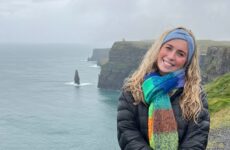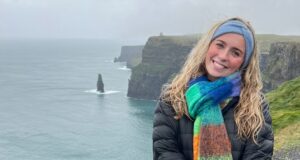By Caroline Connick | Social Media Coordinator
As part of Salve Regina University’s semi-annual Multicultural Education Week, five panelists from various backgrounds led a discussion on the treatment of immigrants titled “Stranger in a Strange Land” this past Wednesday.
This discussion, moderated by Dr. Arthur Frankel of the Salve Regina University Department of Psychology, primarily consisted of each panelist giving accounts of their experience with immigration.
First, Dr. Troy Catterson who teaches courses on race and Chinese philosophy at Salve spoke about his experience as an American living among the Chinese. “Even though I’m not an immigrant to this country, I did live for a substantial amount of time in China, and so I’ve had experience as an outsider in that culture,” Dr. Catterson explained. He dealt with stereotypes in China the same way that many immigrants to the U.S. experience them. For example, even though he spoke Chinese well, he said that people in China would refuse to speak to him in Chinese when they found out that he was American.
Catterson continued to experience feeling like an outsider even after his return to America because he lived in a predominantly Chinese community with his wife. Catterson stated that he remembers a conversation when he and some friends “were talking about differences between Chinese culture and American culture, and the Chinese speakers were all going ‘Oh yeah, this is what is true of,’ what are called laowai.” In Mandarin, laowai is a derogatory expression for foreigner. Catterson explained that “they were saying this as they were in the United States. They were talking about, ‘You laowai, Troy,’” he continued. Catterson expressed the frustration in feeling like a foreigner in his own country. “I was the person who had to insert myself in, and find a place in something that even though I’d wanted to be a part, I could never really be a part,” he said.
Dr. Catterson then went on to explain his wife’s experience as a Chinese woman immigrating to the United States. He talked about how many people would see his wife, and speak very slowly to her assuming that she did not understand English. Catterson shared that this was pretty insulting considering his wife is a very educated woman who speaks English well. “Studies have shown that… when we encounter a person, we judge their intelligence by how they speak. So if you speak English poorly, we all think you’re not as intelligent. Though in fact, you could be very intelligent, just English is not your first language,” Dr. Catterson explained.
The next speaker on the panel was Dr. Joanne Pope Melish who is an associate professor of history emerita at the University of Kentucky involved in the South Kingstown Immigration Task Force. Dr. Melish talked about her experience working with refugee resettlement during the 1980s. Dr. Melish explained that Southeast Asian immigrants during that era “faced a great deal of discrimination on the ground but nonetheless there was an official welcome, which we are not seeing now.” Dr. Melish found the difference in resources available for refugees and immigrants from then to now very troubling. She said, “We all do want to think about history as progressive. Things get better. So, as a historian, I am enraged, just enraged, by what we are doing now.” She elaborated that the policies we have now “is a new and, in my opinion, worse variety of what we’ve done over and over and over again, and we’ve focused it on people of color.”
After that, H. Jefferson Melish, Esq. who is a member of the board of directors for the Rhode Island American Civil Liberties Union (RI ACLU) involved in the South Kingstown Immigration Task Force spoke about the value of diversity in his childhood and career. He explained that his father was a pastor at a very large and diverse church in New York. He spoke very highly of the church’s welcoming of immigrants and people of all backgrounds into the community, particularly on the part of his family. “There was a hurricane in British Honduras, which is now Belize, and a family of eight people were stranded and had to come to the U.S. My parents welcomed them in and they lived with us for two years. This is the kind of thing that is so important to me and is so different than some of the negative things that this country has done,” he said. Melish also described the days of the Civil Rights movement and how his father was so heavily involved in that cause that Civil Rights leaders would come to stay in their family home.
The next speaker was Salve Regina senior and Vice President of the Multicultural Student Organization, Blanca Vaneza Guzmán. Guzmán’s life had been heavily impacted by the issue of immigration in America, as her parents and older sister along with other extended family had come to the U.S. undocumented. Guzmán’s father and uncle worked as crewmen when they were younger, and they tried to earn citizenship in Canada. Because only few members of large families in Guatemala were given access to education while the others were needed to work, Guzmán’s highly-educated uncle was granted citizenship but her father was not. However, her father had a contact in Framingham, MA, so he then crossed into the U.S. from Vancouver and travelled across the country to meet his contact on the East Coast. Her father later brought her mother and older sister to Massachusetts on tourist visas. They ended up staying in America after their visas expired due to a genocide against the indigenous race in Guatemala that was happening during the mid-1980s. Guzmán’s mother had already faced mistreatment in Guatemala for her indigenous roots. “When my mom gave birth to my sister, who was a blonde baby, they didn’t believe that it was hers and they told her that she had died, but had my grandmother not been there to rescue her, I probably wouldn’t even have a sister,” Guzmán said.
Eventually, Guzmán was born here in the U.S. and had to bear the weight of her family’s status on her shoulders all her life. “When I was younger, I had always known that something wasn’t right with my family. I remember having a very weird conversation with my parents,” Guzmán said. “They kind of just sat me down and said, ‘Look, one day your Daddy and I might not come back from work, and if that’s the case your sister’s in charge, and if she has to go too then you have to go to your nearest aunt and uncle’s house and that’s where you will be,’” she recalled.
Then, one morning during her early high school days, Guzmán heard the police at her door. Guzmán said that it wasn’t unusual for the police to come to their house because they lived in a neighborhood where there was a big community policing presence. But this visit was different. “What I thought was weird was that they were identifying themselves in Spanish. They kept shouting, ‘Policía, Policía, Policía!’… It was a team of Immigration and Customs Enforcement officers coming to arrest my father,” Guzmán said. Guzmán explained that she had to wake up her parents, her mother being bedridden due to a recent surgery. Her mother told her, “You need to follow your dad. You need to make sure that they don’t kill him,’ because these officers were wearing, like, bulletproof vests…they were armed to, like, the most maximum capacity as if they were on the hunt for, like, Public Enemy Number One.” She described the ordeal, how she was crying and begging the officers not to take her father away from her, how the officers treated her and her family “like we were worse than animals,” and how the officers handcuffed her father “head-to-foot” before taking him into custody. She stated that her family suffers mental trauma related to the incident to this day.
“On the day that my dad was facing deportation charges,” Guzmán said, “they told us that he was accused of being somebody that he wasn’t; that he was trafficking people, that he was producing fake visas, harboring people in our basement.” But after several years and over $30,000 spent handling the situation, Guzmán’s father was allowed to remain in the country. “It’s a lucky and a happy story, but because of this I never want anybody else to ever have to go through this,” Guzmán said. She knew, however, that plenty of people in this country do still face the possibility of experiencing similar situations. “I have godparents and they have kids… and they’re Salvadorian, and their parents are here due to TPS protections and those are about to expire and they don’t qualify for renewal. So right now my family’s looking into becoming a foster family for [the kids] because in the event that [their parents] are deported, these poor three little boys, they’re going to be left without a family,” she said. Guzmán also pointed out certain flaws in the immigration system that make legalization, temporary residence, and permanent residence very difficult for many undocumented immigrants to obtain. “In 2010, DACA applications averaged at about $425. I can’t imagine what they cost now,” she said.
The final speaker was Roxanna Mendez-Sola, a Salvadorian immigrant and member of the Salve housekeeping staff. She came to America after having endured harassment from her neighbor that caused her to give birth to her first baby prematurely. Mendez-Sola explained her story to the audience stating, “At that time, I was 22 years old. My boyfriend came to the United States because his family brought him over here, so technically I was alone. Every single day, every time that person [got] drunk, I was the one to pay the consequences.” Mendez-Sola expressed to the audience that she was constantly afraid for her life, and that the stress impacted her pregnancy. Mendez-Sola shared, “I give birth to him, but it wasn’t time yet. I have him when I was eight months pregnant. He only lasts five days with me.”
After that, Mendez-Sola felt that there was nothing left for her in El Salvador. She then travelled through Guatemala, Honduras, and Mexico to cross the U.S. border illegally, applied for TPS, and started a new family with her boyfriend. From there, she embarked on a long and expensive road to citizenship. She explained that she was “renewing [her] temporary status, like, every 18 months. But everything costs money.” Mendez-Sola shared with the audience that she paid $7,000 for help getting into the country. Once she was here, she spent about $760 every time she renewed her TPS. Later, Mendez-Sola became a permanent resident of the United States for $6,500 and naturalized for $1,200. Today, Mendez-Sola has two children and feels safe in her new home.
This insightful discussion visibly moved many in the massive audience in Bazarsky Lecture Hall. There were moments of laughter, moments of mesmerized applause, and moments of tears. Long after the discussion ended, a crowd remained in the lecture hall to hug and converse with panelists who had inspired them.













